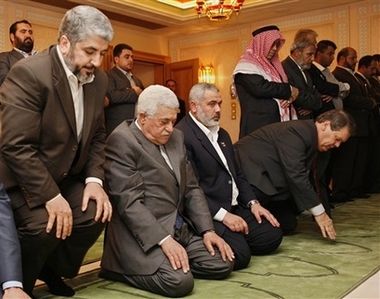Palestinians agree on power-sharing
(AP)Updated: 2007-02-09 07:24
|
|
Palestinian President Mahmoud Abbas, of the mainstream Fatah movement, and Khaled Mashaal, leader of Hamas, signed the accord at a ceremony hosted by Saudi King Abdullah in a palace overlooking the Kaaba, Islam's holiest shrine.
The deal, reached on the second day of the marathon talks, sets out the principles of the coalition government, including a promise that it will "respect" previous peace deals with Israel, delegates said. It also divides up Cabinet posts in the new government.
Announcing the agreement at the ceremony, Abbas aide Nabil Amr read a letter in which Abbas designated Prime Minister Ismail Haniyeh of Hamas to draw up the new government within five weeks according to the formula agreed on in the talks.
Abbas said the deal would "satisfy our people ... and bring us to the shores of peace. ... This initiative has been crowned with success."
Mashaal said the accord "will unify our ranks. There is a commitment and unity. We will preserve this partnership."
Israeli government spokeswoman Miri Eisin told The Associated Press late Thursday that the new Palestinian government must accept all three international conditions: recognition of Israel, acceptance of all former agreements, and a renunciation of all terror and violence. She would not say whether Israel believes the guidelines of the new government fulfill those demands.
Before the ceremony, a Hamas delegate said the deal set the outlines of the new government's political platform, including a provision by which the factions - including Hamas - would "respect" previous peace deals between the Palestinians and Israel. The delegate spoke on condition of anonymity because he was giving out information before the formal announcement.
They will also be based on a document drawn up last summer by Hamas and Fatah activists in Israeli prisons. That document calls for a Palestinian state in the West Bank, Gaza and east Jerusalem, the areas Israel captured in the 1967 Mideast War.
In drawing up the new government, Hamas is to propose an independent candidate to hold the crucial post of interior minister, who would control the Palestinian security forces. Abbas would then approve the candidate. The Interior Ministry post was one of the main obstacles to the deal, with each side reluctant to see it in the hands of the other.
The delegations from Hamas and the moderate Fatah faction talked until 3 a.m. Thursday and resumed at midmorning.
The Saudis, who did not participate in the talks, invested considerable effort in convening the negotiations. The kingdom seeks both an end to the bloodshed in the Palestinian streets and the resumption of formal Israeli-Palestinian settlement talks - something it regards as vital to reducing tensions across the Mideast.
International acceptance is key. Unless Israel, the United States and the European Union find the wording satisfactory, the financial embargo will not be lifted and it will be difficult to advance the peace process.
Israel has refused to talk to the Hamas-led government, though it has held talks with Abbas, a moderate who was elected separately in 2005.
Israeli Prime Minister Ehud Olmert, Abbas and Secretary of State Condoleezza Rice are due to meet Feb. 19 in Jerusalem for talks intended to revive the peace process.
In Gaza City, gunmen fired into the air in celebration and fireworks lit up the sky.
Fish vendor Mahmoud Qassam, 27, watched the signing ceremony on television with his family in their shop in Gaza City's Shati refugee camp.
"For four or five days we've been holding our breath. God willing, this is a permanent agreement, not a temporary truce," he said. "We hope this will lead to lifting the siege," a reference to the West's cutoff of vital foreign aid after Hamas took power almost a year ago.
Four days of gunbattles between Fatah and Hamas fighters killed more than 30 people and wounded over 200 others until the cease-fire took hold Sunday.
The imprisoned Palestinian militant leader Marwan Barghouti sent an e-mail from an Israeli jail that warned: "If the dialogue currently taking place in Mecca fails, history will have no mercy on those who took part, and they will not soon be forgiven by the Palestinian people."
|
||
|
||
|
|
